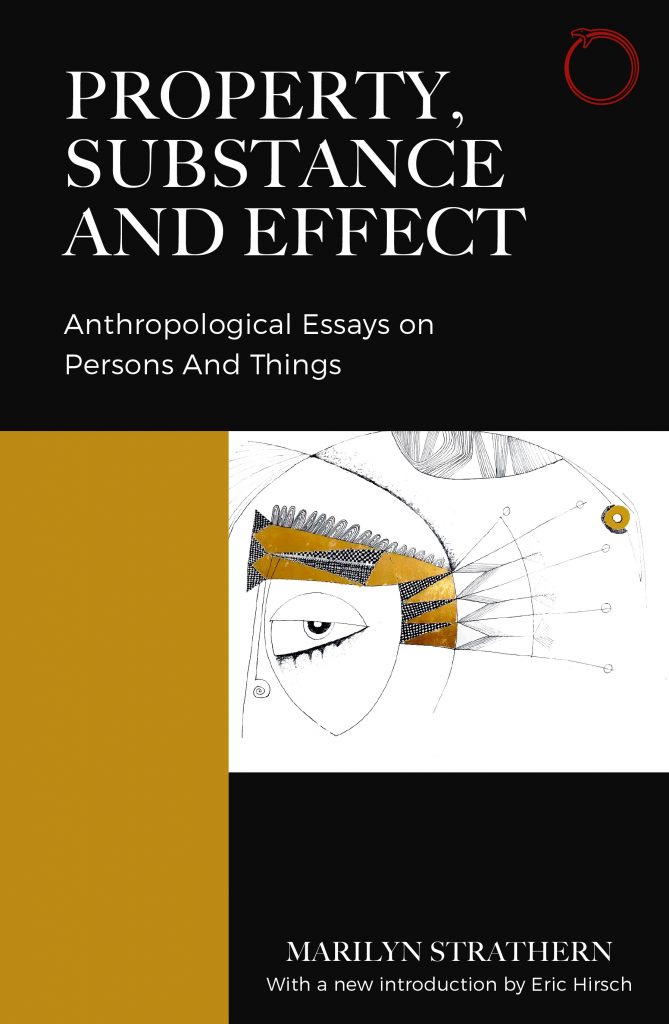Anthropological Essays on Persons and Things
By Marilyn Strathern
Reprinted with a new introduction by Eric Hirsch
In engaging essays, celebrated anthropologist Marilyn Strathern reflects on the complexities of social life.
Property, Substance, and Effect draws on Marilyn Strathern’s longstanding interest in the reification of social relations. If the world is shrinking in terms of resources and access to them, it is expanding in terms of new candidates for proprietorship. How new relations are brought into being is among the many questions about property, ownership, and knowledge that these essays bring together.
Twenty years have not diminished the interest in the book’s opening challenge: if one were inventing a method of enquiry by which to configure the complexity of social life, one might wish to invent something like the anthropologist’s ethnographic practice. A wide range of studies deliberately brings into conversation claims people make on one another through relations imagined in the form of body-substance along with the increasing visibility of conceptual or intellectual work as property. Whether one lives in Papua New Guinea or Great Britain, categories of knowledge are being dissolved and reformed at a tempo that calls for reflection—and for the kind of lateral reflection afforded through the “ethnographic effect.”
“A timely gift. An exercise in both retrospection and imagining worlds and relations otherwise, the book is full of mind-bending reflections on how we might think with a world marked, as ever, by scale-scrambling change. These essays offer something sorely needed right now: a brilliant model of how to embrace and think with incommensurability and instability.”
— Cori Hayden, author of When Nature Goes Public: The Making and Unmaking of Bioprospecting in Mexico
“Strathern’s reflections on the figures of nature, person, and commodity have if anything gained in actuality and acuity, and her contrastive analyses of Melanesia and Euro-America are absolutely indispensable to an understanding of contemporary themes such as the rights of nature, the ecological politics of property, and the constitution of racialized capital.”
— Alain Pottage, coeditor of Law, Anthropology, and the Constitution of the Social: Making Persons and Things
“A profound theoretical reflection on ethnographic activity, this book frames a set of analytical experiments where the intrinsic recursivity of the language of description as object, method, and instrument of analysis is taken to the highest point of epistemic tension. Marilyn Strathern continues here her paradigm-shifting work on knowledge as social relation and vice versa.”
— Eduardo Viveiros de Castro, author of The Relative Native: Essays on Indigenous Conceptual Worlds
Marilyn Strathern is Emeritus Professor of Social Anthropology at the University of Cambridge. She is the author of many books, including Women in Between; The Gender of the Gift; Before and After Gender; Learning to see in Melanesia; Audit Cultures; Kinship, Law, and the Unexpected; and Relations: An Anthropological Account.
Eric Hirsch is Professor of Anthropology at Brunel University London, conducting research in Papua New Guinea. He is author of Ancestral Presence: Cosmology and Historical Experience in the Papuan Highlands.
© HAU Books 2022
ISBN: 9780999157077 [paperback]
eISBN: 9780999157091 [PDF]
6″ x 9″, 158 pp.
$23
© HAU Books, 2022
6″ x 9″, 328 pp.
$30
